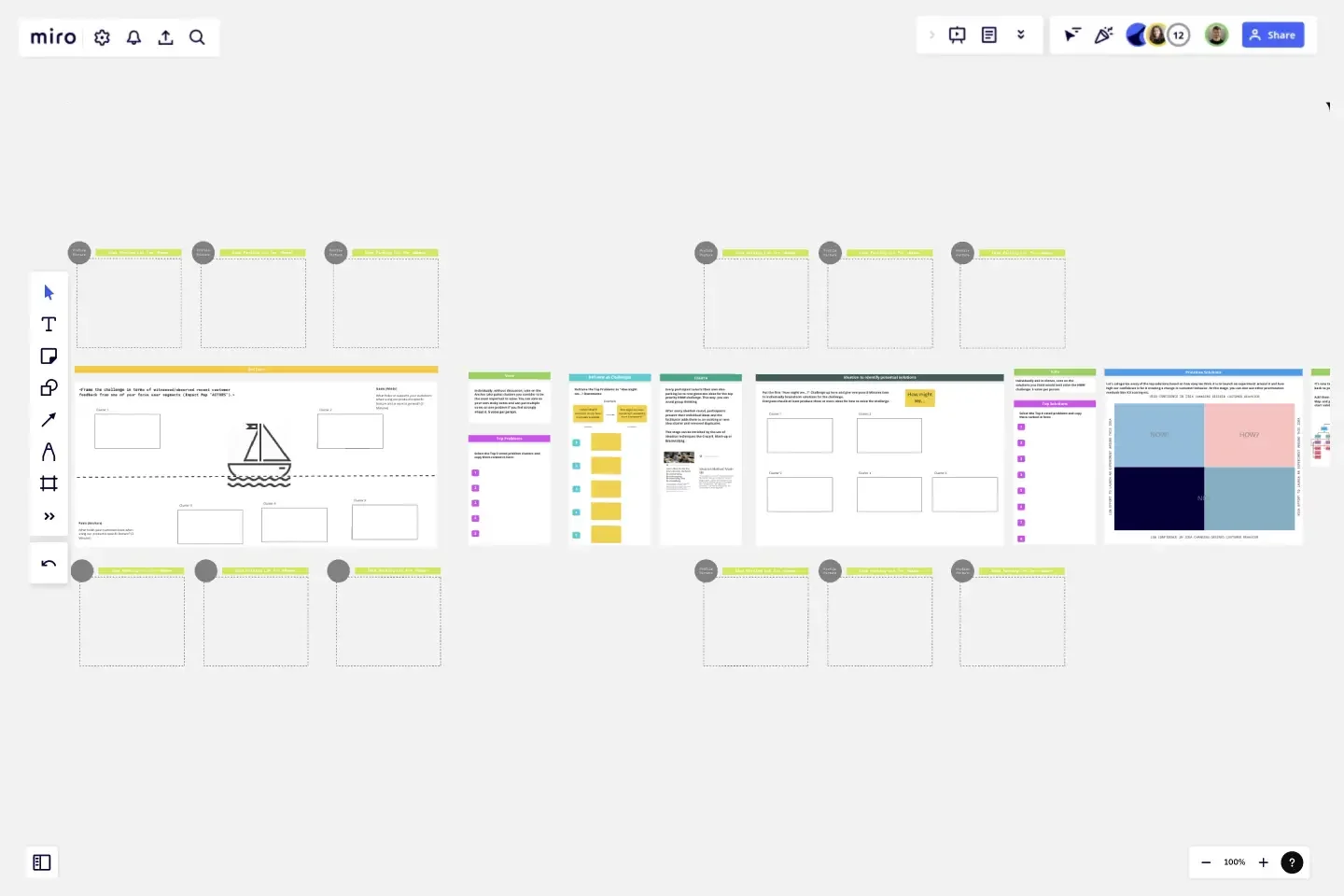Product Discovery Ideation Session
As part of Product Discovery, cross-functional product teams should be given the autonomy and freedom to explore the solution space on their own.
As part of Product Discovery, cross-functional product teams should be given the autonomy and freedom to explore the solution space on their own. Their complementary skills and perspectives lead to objectively better and more creative ideas than top-level management can come up with. But in order to harness this creativity, it takes structure. That's why I created this step-by-step ideation session template for teams to use during Product Discovery. I've incorporated proven ideas from my own experience and from others, while providing enough flexibility to make it your own.
For the "context" stage, I recommend frameworks like Impact Mapping, which can quickly bring participants up to speed in terms of recently gathered user insights. Throughout the ideation process, I encourage a "together alone" working mode, giving individuals the freedom to sort their thoughts without the bias and pressure of group thinking.
The session should end with a prioritization of the identified ideas. Here it's important to keep an iterative and experimental mindset for the following steps of your Product Discovery: Think how easy it would be to launch an experiment around this idea and how high your confidence is at the moment in terms of creating the changes in behavior you have prioritized.
This template was created by Tim Herbig.
Get started with this template right now.
Rose, Bud, Thorn Template
Works best for:
Retros, Agile
The Rose, Bud, Thorn template is a structured method for team reflection and feedback, designed to help teams identify positive aspects, potential opportunities, and challenges within a project or situation. One key benefit of using this template is its ability to promote balanced feedback and productive discussions, which can lead to improved team processes and outcomes.
STATIK Canvas
Works best for:
Agile, Kanban
STATIK Canvas template provides a structured framework for implementing Kanban methodology within teams. By focusing on understanding, shaping, and sharing knowledge, this template facilitates continuous improvement and alignment with organizational goals. Teams can visualize their workflow, identify improvement opportunities, and implement changes iteratively to achieve higher efficiency and effectiveness in their processes.
Daily Stand-up Meeting Template
Works best for:
Agile Methodology, Meetings, Software Development
The entire team meets to review the day before and discuss the day ahead. These daily meetings, also known as “scrums,” are brief but powerful — they identify roadblocks, give each team member a voice, foster collaboration, keep progress on track, and ultimately keep teams working together effectively. This template makes it so easy for you to plan daily standups for your sprint team. It all starts with picking a date and time, creating an agenda, and sticking with the same format throughout the sprint.
Scrum Puzzle Iteration Game
Works best for:
Agile, Games, Icebreaker
The Scrum Puzzle Iteration Game is a hands-on activity that reinforces Scrum principles and practices. By simulating iterative development cycles through puzzle-solving, teams learn the importance of collaboration, adaptability, and continuous improvement. This template provides a fun and engaging way to internalize Scrum concepts and enhance teamwork, empowering Agile practitioners to deliver value more effectively.
Agile Transition Plan Template
Works best for:
Agile Methodology, Agile Workflows
An Agile transformation roadmap can help you, your team, and your organization transition from rigid compliance-heavy methods to the more flexible Agile way of doing things incrementally. From requirements to integrations to security, you can map out your organization's moving parts as “swim lanes” that you can then update regularly. Use your roadmap as a way to tell the story of how you see your product growing over a period of time. Get buy-in without overselling and keep your roadmap simple, viable and measurable. By using an Agile transformation roadmap, you can avoid getting bogged down in details and instead invest in big-picture strategic thinking.
Cost-Benefit Analysis Template
Works best for:
Leadership, Decision Making, Strategic Planning
With so many day-to-day decisions to make—and each one feeling high-stakes—it’s easy for all the choices to weigh a business or organization down. You need a systematic way to analyze the risks and rewards. A cost benefit analysis gives you the clarity you need to make smart decisions. This template will let you conduct a CBA to help your team assess the pros and cons of new projects or business proposals—and ultimately help your company preserve your precious time, money, and social capital.
